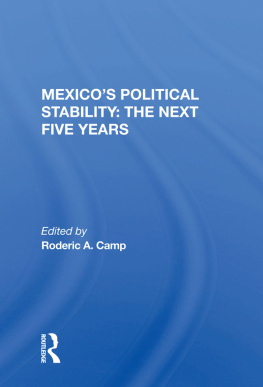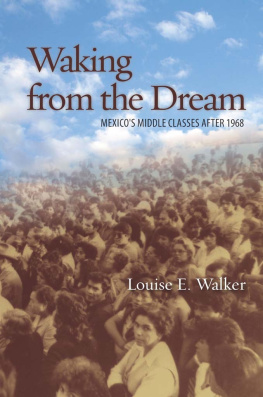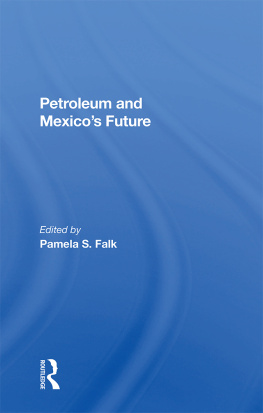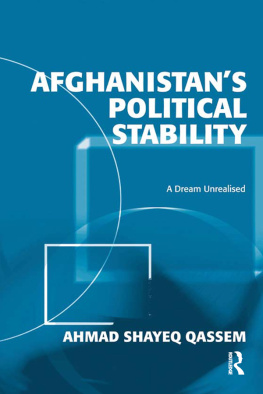About the Book and Editor
Mexico is undergoing its worst economic crisis since the world depression of the 1930s. In this volume contributors analyze significant patterns that might affect political stability and legitimacy, economic viability, and social change over the next several years, often reaching controversial conclusions. They argue, for example, that the military is not likely to change its present civil-military role; that political opposition, rather than political violence or pressure from foreign governments, will have the most profound influence on the changing pattern of political legitimacy and system stability; and that decisionmaking in the private sector may have the greatest potential to resolve or exacerbate the current crisis. Finally, they suggest that because economic conditions have been altered so dramatically in the recent period, Mexican policymakers will need to develop a new range of political alternatives to stabilize the economy and redirect the country's future.
Roderic A. Camp is director of Latin American Studies and chair of the Behavioral Sciences Division at Central College, Pella, Iowa.
To the Mexican People
First published 1986 by Westview Press, Inc.
Published 2018 by Routledge
52 Vanderbilt Avenue, New York, NY 10017
2 Park Square, Milton Park, Abingdon, Oxon OX14 4RN
Routledge is an imprint of the Taylor & Francis Group, an informa business
Copyright 1986 Taylor & Francis
All rights reserved. No part of this book may be reprinted or reproduced or utilised in any form or by any electronic, mechanical, or other means, now known or hereafter invented, including photocopying and recording, or in any information storage or retrieval system, without permission in writing from the publishers.
Notice:
Product or corporate names may be trademarks or registered trademarks, and are used only for identification and explanation without intent to infringe.
Library of Congress Cataloging-in-Publication Data
Mexico's political stability.
(Westview special studies on Latin America and the Caribbean)
Includes index.
1. Mexico--Politics and government--1970- Forecasting. 2. Mexico--Economic conditions--1970- Forecasting. I. Camp, Roderic Ai. II. Series.
F1236.M495 1986 320.972 86-11194
ISBN 13: 978-0-367-01085-0 (hbk)
Roderic A. Camp
Introduction
This book is the result of a report made to the Department of State in December, 1985, by a team of Mexicanists. The task given to this group of individuals was to identify a small number of critical issues which would have an impact on Mexico from 1985 to 1990, to analyze the importance of those issues for Mexico's domestic political situation, and to offer observations on how Mexico might be affected by these issues through 1990.
One of the more difficult tasks we faced was how to select these issues, and specifically, what broad themes should each of us consider in accomplishing our individual assignments. The methodology which went into choosing these issues was based on a survey of three small groups of United States experts. The first group gathered in March, 1984, to discuss a set of issues which they identified as most critical. Those participating in the conference were: Daniel C. Levy, Kevin Middlebrook, Dale Story, John Bailey, Roderic A. Camp, Sidney Weintraub, and Clint E. Smith. A second group, who are part of the author's research team, provided additional suggestions. In addition to Daniel C. Levy and John Bailey, it includes Peter H. Smith, Edward J. Williams and William P. Glade. I also considered a list of issues I ferreted out of a conference on Mexico sponsored by the Congressional Research Service in Washington on November 30, 1983. Also, I gave special consideration to those Issues President de la Madrid identified as most important in an interview with me in late August, 1984. Finally, my research team met with representatives of the State Department and numerous government agencies in January, 1985, where our original list of issues (seventeen) were narrowed down to the ten analyzed in this book. Naturally, there are issues and themes excluded which deserve attention for a complete view of the Mexican situation, but collectively, and given the specific criteria of analyzing those issues which seemed to be most important in the short term, these were the ones chosen. An additional criteria, of course, was time, since the entire report had to be completed within nine months. Finally, we also adhered to strict limitations on length. The reports represented as chapters in this book are essentially the same as originally presented, and therefore, governed by all of the original criteria.
The January meeting in Washington made clear that all interested parties wished to see each issue analyzed from a similar perspective. To tie the analysis together, each author was asked to focus on five cross-cutting themes. Implicitly, we hope to offer interpretations as to the implications of individual issues, through 1990, for: political stability, economic viability, societal change, systemic legitimacy and Mexican-United States relations. In the following, I have attempted a brief overview of some of the conclusions of each contributor as they relate to these five cross-cutting issues, including a comment on the political scenarios the authors see as most likely in the immediate future.
The difficulty with taking ten major issues and summarizing their significance for important cross-cutting themes is that, as can be seen from the issue topics themselves, nearly all are interrelated. Despite that difficulty, certain issues, at least from short and long term perspectives, have more or less relevance to the five major concerns in Mexico in the next five years.
Political Stability
Two of the cross-cutting issues themselves are substantially intertwined. Stability is very much a consequence of the legitimacy of a regime, and stability for any society operates within the value system of that society, not from interpretations of outside observers. Not sharing another culture's value system makes it difficult for the foreigner to assess stability, and indeed, might direct him to make serious misjudgements about existing levels of stability. Moreover, to discuss Mexican political stability in the foreseeable future, we must start at a given point, 1985, and suggest changes that might occur through the end of the decade. One way we might address the potential for political instability, and by no means does a general Interpretation exist, is to conceptualize it as the degree to which the political system handles demands through legally (customarily) accepted channels in that society, and the degree to which the value system of the governmental elite, as reflected in their policy actions, corresponds with the desires of the ordinary citizen.








